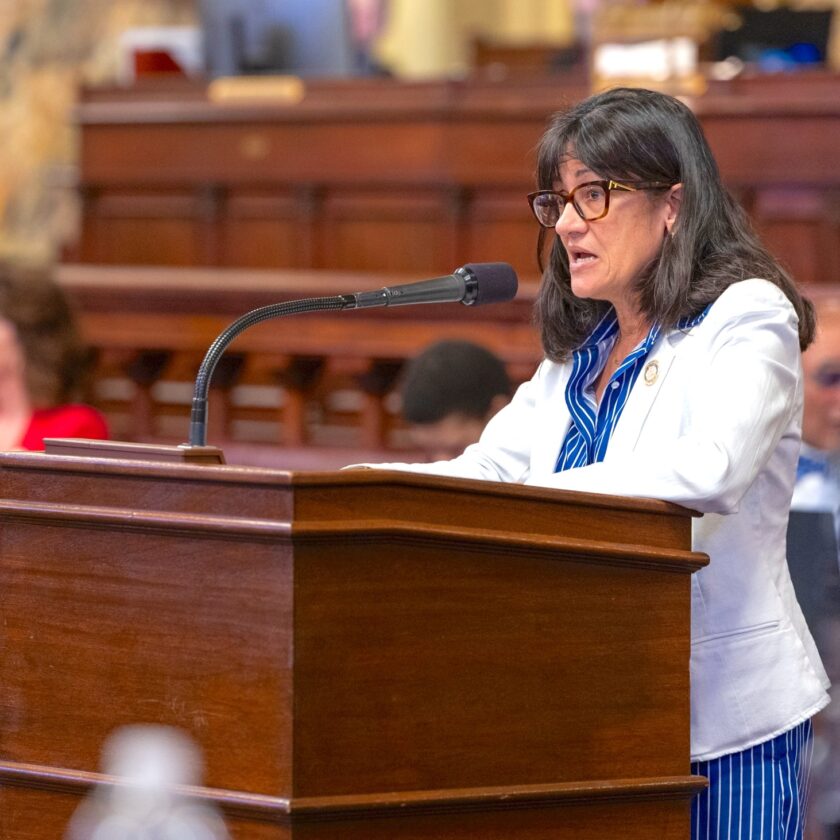Lawmaker pitches more local eBike oversight

Rep. Jill Cooper, R-Export, is pictured speaking on the House floor earlier this month.
Local officials’ hands are largely tied when it comes to eBikes by existing state law.
House Rep. Jill Cooper, R-Export, is drafting legislation to untie local lawmakers’ hands. Cooper has introduced a co-sponsorship memorandum for legislation she is drafting that would give local governments clear authority to establish their own ordinances for eBikes.
“As background, current law permits eBikes to be operated on roads and sidewalks, but only if the eBike does not exceed certain limitations related to size, speed, weight and motor power,” Cooper wrote in her co-sponsorship memorandum. “Currently, there are many constituents who argue eBikes should be required to be licensed, registered and insured like a motorcycle. On the other hand, proponents of eBikes are opposed to licensing, registering and insuring electric bicycles, as they believe requiring eBikes to follow rules established for traditional bicycles is sufficient. To address the issue, my legislation will implement a middle-ground approach by giving local municipalities the clear authority to establish ordinances for eBikes operated on roads and sidewalks and treat eBikes differently than traditional bicycles.”
Warren City Council members discussed concerns with e-bikes during council meetings earlier this year. While no bicycles are allowed on sidewalks downtown due to state regulations, council members expressed concern over e-bikes especially. An e-bike, defined as “a pedalcycle with electric assist that weighs less than 100 pounds and whose motor is not more than 750 watts.” It has operable pedals and is not capable of going faster than 20 mph on a level surface when powered by the motor source only. Further concerns were raised about the speed of the e-bikes on sidewalks, the danger to pedestrians, and the lack of licensing and age requirements. The council proposed looking at ordinances in other towns that have had similar issues to see what the potential solutions were. The city could change city ordinances, but regulations regarding licenses, registrations and helmets would require changing state law. City traffic laws can be enforced on e-bike users.
In August, Warren Police Chief Joseph Sproveri said the city has installed new signs at 45 locations throughout the downtown area while officers trained in bike enforcement have been patrolling on the department’s e-bikes. Numerous individuals have been stopped, with the emphasis being placed on providing education and warnings, not tickets, being given.
Sproveri told council members during an August meeting that officers had made 12 stops involving 15 people between the council’s July 21 meeting and its meeting Aug. 18. During the August meeting Sproveri reiterated that Warren and other municipalities around the state are waiting for state law to catch up with the new biking technology.
Cooper is proposing an increase in fines for bicycle law violations committed on an eBike from $10 to $50, as well as creating a new fine of $100 if the careless operation of an eBike results in bodily injury. The fines would apply statewide and do not require municipal approval. Municipalities that choose to do so would be able to establish their own ordinances rather than wait for a state bill that could take years to take effect.
“This flexible framework will give communities the freedom to address their unique needs while simultaneously alleviating the need for a one-size-fits-all approach on eBikes,” Cooper wrote in her co-sponsorship memorandum. “Under the legislation, a municipality may establish eBike-specific ordinances, which may require eBike registration with a reasonable registration fee, limit or prohibit eBikes on roads or sidewalks and establish fines for ordinance violations. The legislation will also authorize municipalities to establish ordinances that impose fines specifically for the operation of eBikes that exceed the limitations in current law.”




